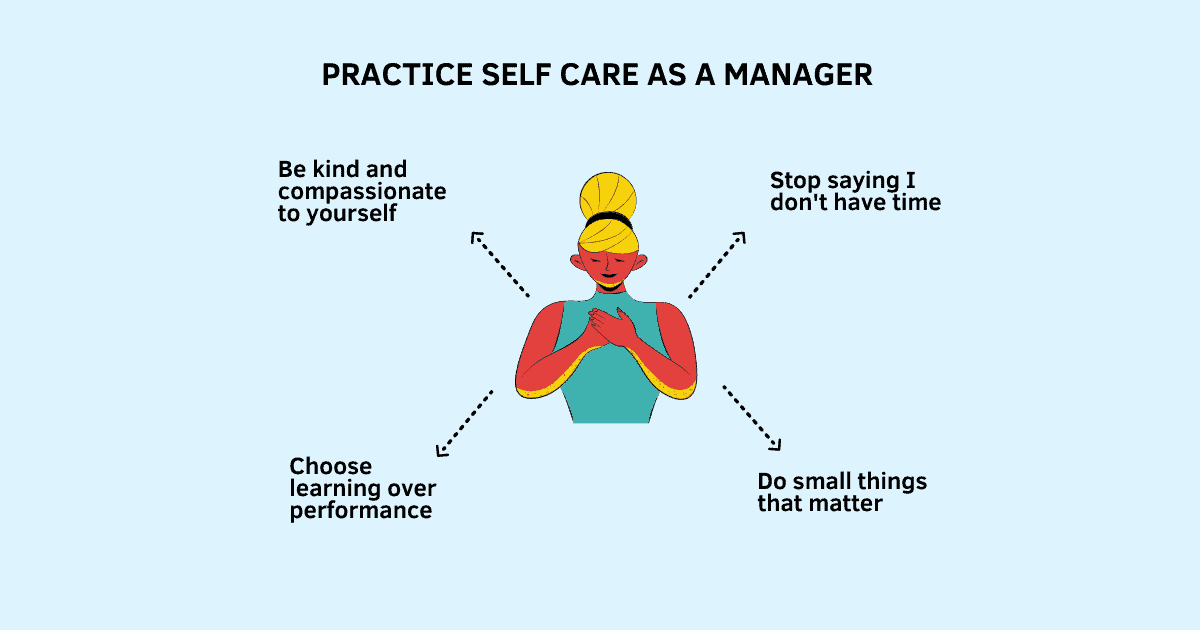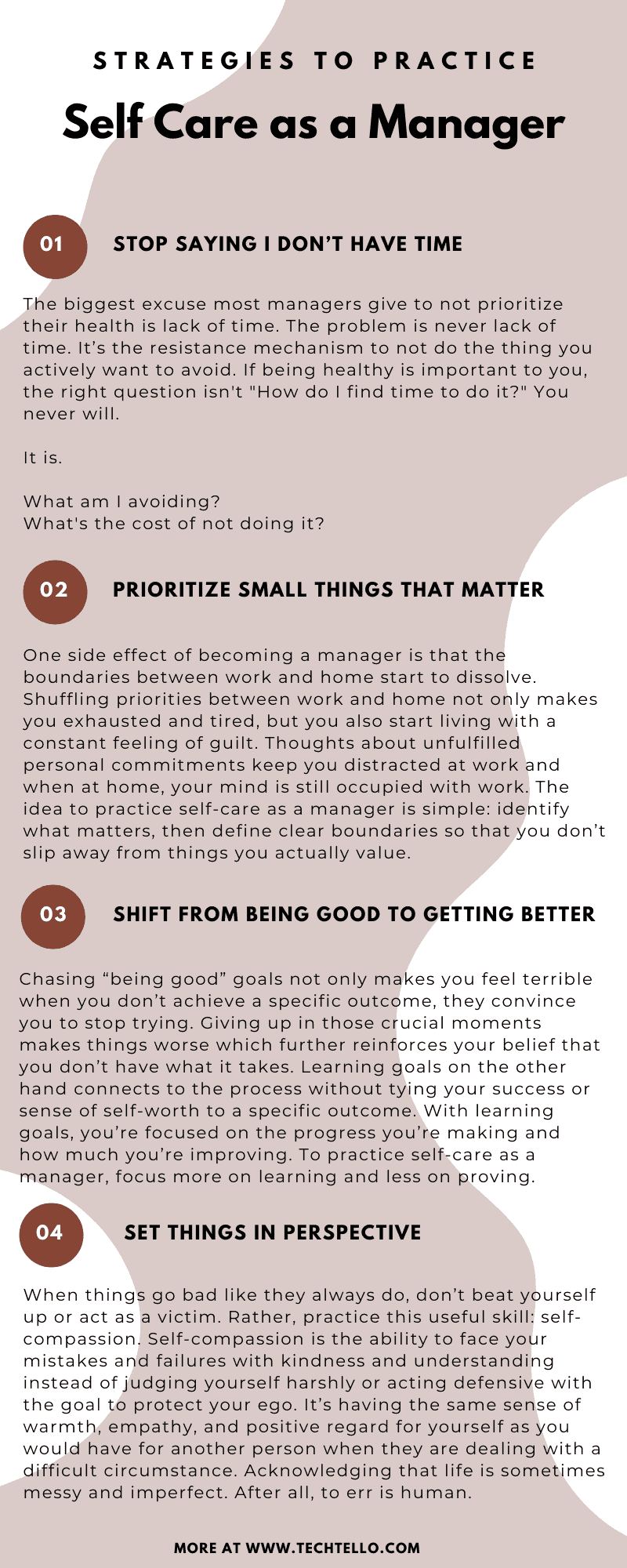How to Practice Self Care as a Manager

Management is a tricky job. You are required to care for other people and their growth while also feeling responsible for their emotional and mental well-being. If you’re someone who takes their role seriously, you might already be putting in a lot of effort to stand out as an effective manager to your people.
But being a manager isn’t easy. Irrespective of how much time you spend or how hard you try, if you refuse to give yourself the space needed to feel physically, mentally, and emotionally strong, you can never meet the demands of your people or feel fulfilled with the idea that you’re doing a good job.
No doubt, most managers want to do their job right. And yet they don’t realize that being a good manager to others requires managing yourself well first.
Management isn’t a solo sport. It’s more like a game of football. Even if you’re a great player on the court who knows how to hit perfect shots, being unprepared to handle unexpected shots from the other players on the court can throw you off balance. You not only need to keep your calm when the game doesn’t go as expected, but an important part of playing the game well is also observing other players on the court, reiterating your strategy, and fine-tuning your approach in a way that makes you feel in control.
There isn’t a rule book for all the decisions you need to make and all the steps you need to take. You will make plenty of mistakes on the way. You will have a hard time getting your ideas heard and convincing others. The uncertainty of your decisions along with the daily struggle to make things happen can be quite taxing on your personal health and mental wellbeing.
Unless you learn to take care of yourself, you can’t really be productive. Practicing self-care as a manager isn’t just necessary, it should be your topmost priority.
Strategies to practice self-care as a manager
Stop saying I don’t have time
The biggest excuse most managers give to not prioritize their health is lack of time.
Think about it for a moment. Isn’t it hard to believe that giving ½ hr of the day to exercise or cooking a healthy meal is a real struggle for someone who’s willing to spend 8-12 hours of their time on the job?
And yet the struggle is real. Most managers don’t do it not because they can’t find time to do it, but because they manipulate themselves into thinking they don’t have time.
The problem is never lack of time. It’s the resistance mechanism to not do the thing you actively want to avoid. Wired to prioritize instant gratification over long-term rewards, running for a few minutes, going for a swim, or hitting the gym takes a backseat. Tired after a long day’s work, those things hardly seem lucrative. Convinced that today was just a busy day, you promise to do better tomorrow and either crash to sleep or reward yourself by watching a bit of TV.
If being healthy is important to you, the right question isn’t “How do I find time to do it?” You never will.
It is.
What am I avoiding?
What’s the cost of not doing it?
Jake Knapp writes in Make Time “Make Time is a framework for choosing what you want to focus on, building the energy to do it, and breaking the default cycle so that you can start being more intentional about the way you live your life.”
Once you decide to care for yourself and prioritize your health, here’s the trick: start your day by doing the thing (exercising, healthy meal, meditation, etc) in the morning before you head to work. Starting your day by caring for yourself sets a positive tone for the rest of the day too.
Daily Weekly Monthly Planner Worksheets
Manage your to-do list, stay productive and cultivate healthy life habits with these planners.
Prioritize small things that matter
One side effect of becoming a manager is that the boundaries between work and home start to dissolve. There’s always more to do than what you can achieve in a day. Urgent takes priority over the important tasks leaving you feeling unaccomplished at the end of the day.
Shuffling priorities between work and home not only makes you exhausted and tired, but you also start living with a constant feeling of guilt. Thoughts about unfulfilled personal commitments keep you distracted at work and when at home, your mind is still occupied with work. The desire to be a good manager and the guilt of not pursuing other goals that add meaning to your life leaves you constantly conflicted between work and home.
When competing priorities demand your attention and you make decisions on the fly, no doubt most decisions end up in work. A few more minutes in the evening or a quick reply to an email over the weekend soon turns into an extra hour. Unless you consciously prioritize what’s important to you, these unhealthy practices become a part of your lifestyle.
“Time-management hacks, life hacks, sleep hacks, work hacks. These all reflect an obsession with trying to squeeze more time out of the day, but rearranging your daily patterns to find more time for work isn’t the problem. Too much shit to do is the problem”, says Jason Fried in It Doesn’t Have to Be Crazy at Work. In other words, do less things, but do them well.
The idea to practice self-care as a manager is simple: identify what matters, then define clear boundaries so that you don’t slip away from things you actually value.
For example: If you have once a month dinner outings with your friends, or twice a week yoga classes in the evenings or it’s having dinner with your kids that matters to you, put them on your calendar much like you would do other things. Stay present and enjoy those moments without the distractions of work. Do the same for your work priorities as well.
These 2 steps usually work for me:
- Identify small things that matter.
- Stay productive while doing them.
Eisenhower Productivity Planner Worksheet
Organize your to-dos and clear out unnecessary tasks with the help of this powerful planner.
Shift from being good to getting better
As a manager, you are likely to face many challenges and setbacks along the way. How do you deal with difficulty when it happens – do you try to stay persistent or give up with the feelings of self-doubt?
When you adopt performance goals for yourself, you want to prove to others how smart, talented and capable you are. Performance goals are tied to your sense of self-worth which makes you focus less on learning and more on achieving specific outcomes.
Heidi Grant calls them “being good” goals. In Succeed, she writes “Performance goals are characterized by an all-or-nothing quality—you either reach the goal or you don’t. You win or you lose…When all you care about is being good, being almost good or mostly good is really not much consolation.”
Chasing “being good” goals not only makes you feel terrible when you don’t achieve a specific outcome, they convince you to stop trying. Giving up in those crucial moments makes things worse which further reinforces your belief that you don’t have what it takes – sort of a self-fulfilling prophecy.
Learning goals on the other hand connects to the process without tying your success or sense of self-worth to a specific outcome. With learning goals, you’re focused on the progress you’re making and how much you’re improving. Challenges and setbacks don’t discourage you. Rather, they signal the need to put in more effort, try a different strategy or ask for help. You’re willing to do anything that will help you move forward.
Heidi Grant calls them “getting better” goals. She writes “These goals are tied to self-worth in a totally different way, because they are about self-improvement rather than self-validation—about becoming the best, most capable person you can be, rather than proving that you already are.”
As a manager, things won’t always go as expected. You will face many obstacles on the way to success. The goals you set for yourself (being good or getting better) profoundly impact not only how you feel, but also how you act afterward.
To practice self-care as a manager, focus more on learning and less on proving. You will not only find yourself less anxious and stressed, but also more content knowing that you can always do well if you’re willing to try just one more time.
Set things in perspective
When you look at others, do you expect them to do everything perfectly – no mistakes, no screw-ups? Do you expect them to bite off more than they can chew? Do you expect them to never face self-doubt when facing uncertainty or making critical decisions?
When it comes to you though, do you apply a different set of rules?
- Does failure create fear and resistance in your mind?
- Do you worry that making wrong decisions will hurt your competence?
- Do you feel anxious about facing criticism?
- Do you try to hide your failures from others?
To be effective in your role as a manager, you need to shift from self-doubt to clarity and action. And you can’t do that if you constantly turn to blame or self-criticism.
When things go bad like they always do, don’t beat yourself up or act as a victim. Rather, practice this useful skill: self-compassion.
Self-compassion is the ability to face your mistakes and failures with kindness and understanding instead of judging yourself harshly or acting defensive with the goal to protect your ego. It’s having the same sense of warmth, empathy, and positive regard for yourself as you would have for another person when they are dealing with a difficult circumstance. Acknowledging that life is sometimes messy and imperfect. After all, to err is human.
Kristin Neff, a pioneer in the field of self-compassion research describes it as “Instead of mercilessly judging and criticizing yourself for various inadequacies or shortcomings, self-compassion means you are kind and understanding when confronted with personal failings – after all, who ever said you were supposed to be perfect?”
She defines three main components of self-compassion:
- Self-kindness: Be gentle and understanding with yourself rather than harshly critical and judgmental.
- Common humanity: Feel connected with others in the experience by realizing that nobody is perfect all the time.
- Mindfulness: Hold experience in balanced awareness, rather than ignoring pain or exaggerating it.
Self-Compassion Workbook
Cultivate kindness and strength in the face of difficulty and foster a new, more gentle and loving perspective on your struggles.
To practice self-care as a manager, cultivate self-compassion, and stop chasing after high self-esteem. Self-compassion will set things in perspective helping you stay more calm and relaxed thereby enabling you to make conscious choices instead of reacting to your circumstances.
You can be a great manager and also be great to yourself. To practice self-care as a manager, take control of your time, prioritize small things that matter, shift from “being good” to “getting better,” and set things in perspective.
Summary
- To be an effective manager, you not only need to be good to your team, but you also need to be good to yourself.
- If you don’t prioritize your mental health and personal well-being, it will hurt your productivity and performance.
- To practice self-care as a manager, you need to stop giving lack of time as an excuse and start doing activities that will keep you physically and mentally strong (exercising, eating healthy).
- Instead of stressing about the big things in your life, identify small things that matter, define boundaries and spend time away from distractions to make your time count and all that you do productive.
- Instead of trying to be good by proving that you’re smart and capable to others, try being better by focusing on your progress, how much you’re improving, and the things you’re learning.
- When things don’t go as expected, don’t be judgmental and self-critical. Use self-compassion as a tool to acknowledge your difficulties, look past your failures and not let your mistakes get in the way of taking action.


































